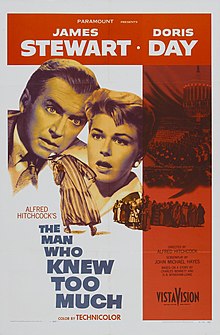Actor Doris Day dies at 97
Thursday, May 16, 2019
US singer, actor, and animal rights advocate Doris Day died on Monday at her home in Carmel Valley, California. Day made many studio albums, was awarded the Presidential Medal of Freedom, and rescued animals from Hurricane Katrina.
Day's animal foundation said she had been in otherwise "excellent physical health for her age" but had recently had pneumonia. Day, they said, desired no memorials or grave markers.

Image: unknown photographer.
Fashion designer Mary Quant described Day to the BBC in 2002: "Doris Day was America. Doris Day was everything that was wonderful about America. She was all woman, as well as being the girl next door. She had it all."
Day was born Doris Mary Ann Kappelhoff in Cincinnati, Ohio in the United States in 1922. The daughter of a music teacher, she had early planned on a dancing career but broke her leg in a car-train collision at age 12. She began singing first on Cincinnati radio and then in clubs. Reportedly, her name was shortened to "Doris Day," imitating a song called "Day after Day," so it would fit on a sign.
Over the course of her singing career, Day made 29 studio albums and performed live with big bands, such as Les Brown and His Band of Renown. Day was paid more than any other female singer by 1946. In film, she was successful in romantic comedies and musicals.
Though she was nominated for the Oscar for the 1959 romantic comedy Pillow Talk, opposite Rock Hudson, Day personally considered her best film performance to be her portrayal of singer Ruth Etting in the James Cagney film Love Me or Leave Me. She also performed in a film by director Alfred Hitchcock, The Man Who Knew Too Much.

Image: Paramount Pictures, Inc..
For much of her career, Day presented a very wholesome image. "I have the unfortunate reputation of being Miss Goody Two-Shoes, America's Virgin, and all that," Day said in her 1976 autobiography, "so I'm afraid it's going to shock some people for me to say this, but I staunchly believe no two people should get married until they have lived together[.]"
Day made her last movie in 1968 and, with debts left behind after the death of her third husband, hosted The Doris Day Show on television until 1973, at which point she focused her career primarily on animal rights, founding the Doris Day Animal Foundation.
Humane Society executive director Sara Amundson said Day "founded one of the first national animal protection organizations dedicated to legislative remedies for the worst animal abuse[,]" which "led to dozens of bills, final rules and policies on the federal level[.]" Amundson cited improvements to the treatment of research chimpanzees and the ending of animal abuse videos.
In 1985, Day invited former co-star Hudson, then visibly deteriorating from AIDS, to appear on television together as part of Day's talk show Doris Day's Best Friends. Although dogs were the purported subject of the episode, Hudson's deterioration became public knowledge; news spread that a star such as Rock Hudson had AIDS, which at the time was highly stigmatized.
When interviewed by the BBC, Day said of Hudson, "Nothing was ever talked about as far as his private life, I must tell you. Many people would ask me, 'Is Rock Hudson really gay?' and I said, 'It's something that I will not discuss. First of all, I know nothing about his private life, and if I did I wouldn't discuss it, so I can't tell you one thing about him except that he is a nice man.'"
Day had one child, record producer Terry Melcher, with her first husband, musician Al Jorden. She was also married in turn to George Weidler, Marty Melcher, and Barry Comden, whom she divorced in 1981. She said Jorden had been physically abusive to her.
In a 2006 interview with magazine The Bark, Day said, "I've been through everything. I always said I was like those round-bottomed circus dolls — you know, those dolls you could push down and they'd come back up? I've always been like that. I've always said, 'No matter what happens, if I get pushed down, I'm going to come right back up.'"
Day's son, Terry Melcher, predeceased her in 2004.
Sources
- Julia Rubin with Bob Thomas and Shawn Marsh. "Doris Day, actress who honed wholesome image, dies at 97" — Associated Press, May 13, 2019
- Benjamin Lee. "Doris Day, celebrated actor and singer, dies aged 97" — The Guardian, May 13, 2019
- A Times Staff Writer. "Doris Day, Rock Hudson and introducing America to AIDS with empathy and love" — LA Times, May 13, 2019
- Tim Teeman. "Doris Day Was America’s Sweetheart With Added Steel" — The Daily Beast, May 13, 2019
